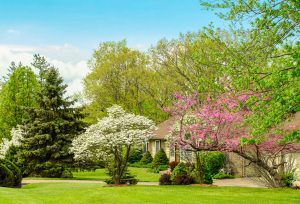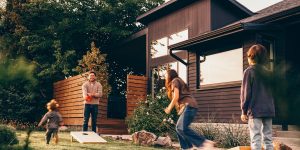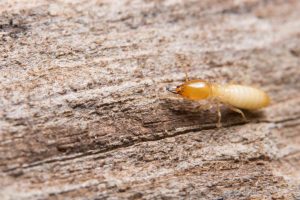Ventilation is a word that conjures up that feeling of free-flowing air, light, and a pure environment that calms our spirits and keeps us healthy, and this is precisely what Eurobond Ventilated Facades are designed to accomplish.
A Ventilated Facade as the name suggests is a facade that is designed to provide better air circulation. It also provides protection against the vagaries of the weather, which is why it is also known as Rain-screen Cladding. This multi-layered facade consists of the cladding of the eternal wall, rear insulation material, an air gap in between the two, a vertical metal sub-structure, and brackets. The air gap is kept open at the top and bottom and the cladding to has small open joints – all of which contribute to the natural ventilation of the facade. The benefits of Ventilated Facades extend still further as they also positively impact indoor temperatures, save on power bills, filter out external sounds, enhance robustness, and add to the visual appeal of the building.
Let’s explore the principle that governs Ventilated Facades. The fact that air which is a free and renewable resource is central to the Ventilated Facade makes it a sustainable and economic option. The air gap between the cladding and insulation material creates a funnel through which air continuously circulates promoting the dual advantage of reducing the building’s internal heat absorption in summer, and retaining the heat within the building in winter. This helps bring down power consumption at all times, contributing to both energy and cost savings. The multi-layering of wall cladding, insulating material, and air gaps are good ways of reducing solar radiation. The benefits go still further with the air gap preventing surface condensation, and promoting dry insulation of the walls and slabs. The ventilation gap, by protecting the insulation against moisture, helps the external walls to dry quickly thus preventing capillary moisture movement into the construction. This reduces condensation and humidity which in turn keeps the interiors moisture-free, fostering pleasant interiors.
Advantages of Ventilated Facades
The air circulation in the Ventilated Facade provides natural ventilation, keeping the interiors naturally ventilated and comfortable. As explained above, the insulation material and other layers help to reduce the building’s heat absorption in summer and retain heat in winter thus regulating temperatures both in summer and winter, enhancing ventilation, and keeping the interiors pleasant in all seasons.
The constantly circulating fresh air in the Ventilated Facade makes it ‘self-breathing’ thus avoiding moisture and humidity in the building’s exteriors and interiors. This eliminates the possibility of mildew and fungus. The air gap also acts as a shield to prevent water from entering through the cladding joints.
- Energy Efficiency and Cost Reduction
Since Ventilated Facades help to reduce the building’s heat absorption in summer and retain heat in winter, the energy consumption by heating and cooling devices reduces by up to an estimated 30%, and consequently the costs reduce too.
The insulation material and multi-layering in the Ventilated Facade improve internal acoustics by filtering out the external sounds by 10 to 20%.
The air gap in a Ventilated Facade prevents rainwater from seeping into the building and thus acts as a waterproofing layer for the building’s protection.
- Reduces Structural Movement
Ventilated Facades with their multi-layering and insulation, protect the building from exposure to extreme temperature changes, which in turn helps reduce the expansion and contraction of the building structure.
ACP Ventilated Facades are robust and suited for all types of weather. They also come in a variety of colours and designs thus adding beauty and durability to the building. Besides, they are a good way to hide pipes and other such essentials which tend to mar the beauty of the building.
ACP Ventilated Facades are recyclable and therefore environmentally friendly. Since they are also built to last for a very long time, they don’t add to unnecessary waste generation and this too makes them eco-friendly.
Ventilated Facades require minimal maintenance and thus save on routine maintenance costs. This proves to be good cost savings in the long term.
ACP being a sturdy material makes the Ventilated Facade long-lasting. Apart from this, the principle on which Ventilated Facades work helps keep the exterior cladding material dry, further augmenting the life of the facade.
While the initial costs of Ventilated Facades may seem high, it is in fact cost efficient when viewed from a long-term perspective, because of the longevity and low maintenance costs. Besides, provides its energy saving also brings down power bills – yet another cost saving. Thus, the collective long-term cost savings, more than compensate for the initial cost. Besides this, there is no price tag that can be attached to the benefits of healthy and comfortable interiors that filter out the noise and environmental pollution.
A point to note is that there’s a science behind Ventilated Facades which is why it is vital to meet stringent industrial design standards, material recommendations, and precise measurements. Hence, the design phase has to be carefully planned to rule out unwanted modifications. The design must ensure continuous entry of fresh air at the bottom which should circulate unimpeded and come out at the top. This constant, free-flowing air circulation is very important for perfect ventilation and avoidance of moisture build-up.
Eurobond, with its experience of over two decades, and its focus on innovation, ensure that you get robust, aesthetic, lightweight, and fire-retardant panels for well-ventilated facades that protect your building exteriors and keep the interiors comfortable in every season. At Eurobond, beauty, and elegance, cost-effectiveness and eco-friendliness, safety, and sustainability are all important considerations. So go ahead and transform your buildings with style, while simultaneously protecting your interiors and exteriors for years to come, with Eurobond Panels.
Read the full article here














